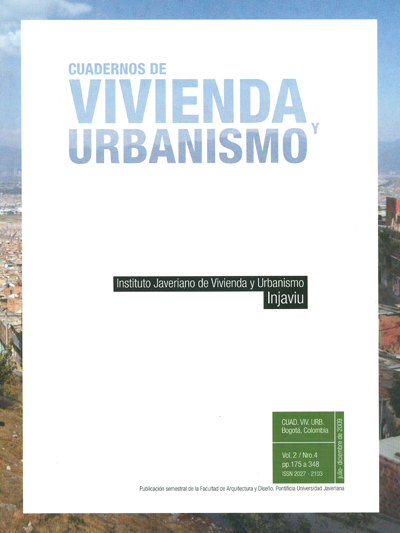Abstract
The Colombian government promoted the “Mission for the design of a strategy to reduce poverty and inequality”; [MERPD] due to the increase in the levels of poverty in the country (deterioration of the social indicators and reversal of the progress in poverty inequality of the 70’s and 80’s). This mission was oriented to define a long-term social policy based on the evaluation studies needed to formulate the required reforms. In the scope of housing, the main research was the one which has served as the base for the development of this paper: The housing conditions of households and their relation to poverty.
Within the content of the research, it is presented a conceptual development related to the following topics: Functioning of the institutional framework of the housing sector and Proposal of the strategy that the country should follow to achieve progresses in the housing policy. The first encompasses aspects about the sector’s institutions, housing finance, land market, national and local policies and security of tenure. Secondly, the presented proposals include institutional consolidation, decentralization deepening in the formulation and implementation of the housing policy, the sectoral model of management, the expansion of programs and instruments of policy, the development of housing markets and the increase in public expenditure.
This journal is registered under a Creative Commons Attribution 4.0 International Public License. Thus, this work may be reproduced, distributed, and publicly shared in digital format, as long as the names of the authors and Pontificia Universidad Javeriana are acknowledged. Others are allowed to quote, adapt, transform, auto-archive, republish, and create based on this material, for any purpose (even commercial ones), provided the authorship is duly acknowledged, a link to the original work is provided, and it is specified if changes have been made. Pontificia Universidad Javeriana does not hold the rights of published works and the authors are solely responsible for the contents of their works; they keep the moral, intellectual, privacy, and publicity rights.
Approving the intervention of the work (review, copy-editing, translation, layout) and the following outreach, are granted through an use license and not through an assignment of rights. This means the journal and Pontificia Universidad Javeriana cannot be held responsible for any ethical malpractice by the authors. As a consequence of the protection granted by the use license, the journal is not required to publish recantations or modify information already published, unless the errata stems from the editorial management process. Publishing contents in this journal does not generate royalties for contributors.


